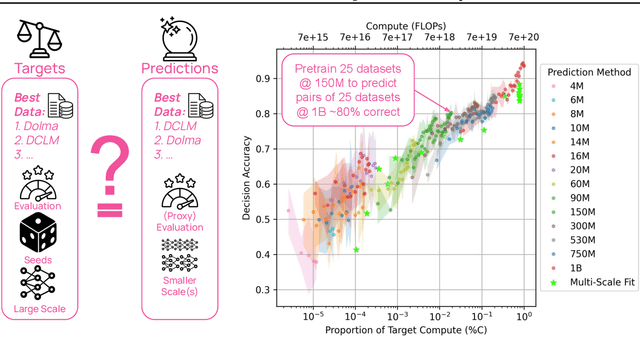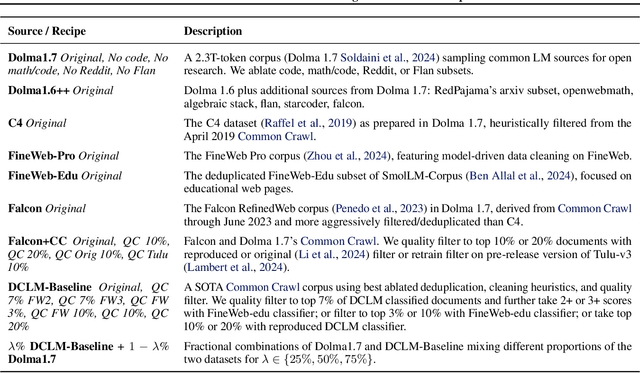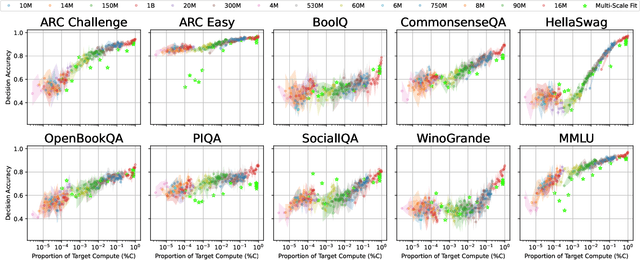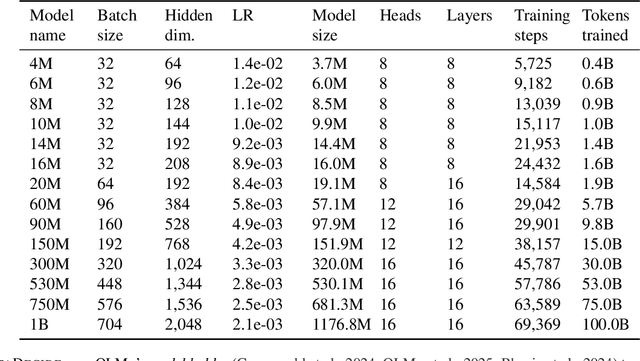Nguyen Tai
DataDecide: How to Predict Best Pretraining Data with Small Experiments
Apr 15, 2025



Abstract:Because large language models are expensive to pretrain on different datasets, using smaller-scale experiments to decide on data is crucial for reducing costs. Which benchmarks and methods of making decisions from observed performance at small scale most accurately predict the datasets that yield the best large models? To empower open exploration of this question, we release models, data, and evaluations in DataDecide -- the most extensive open suite of models over differences in data and scale. We conduct controlled pretraining experiments across 25 corpora with differing sources, deduplication, and filtering up to 100B tokens, model sizes up to 1B parameters, and 3 random seeds. We find that the ranking of models at a single, small size (e.g., 150M parameters) is a strong baseline for predicting best models at our larger target scale (1B) (~80% of com parisons correct). No scaling law methods among 8 baselines exceed the compute-decision frontier of single-scale predictions, but DataDecide can measure improvement in future scaling laws. We also identify that using continuous likelihood metrics as proxies in small experiments makes benchmarks including MMLU, ARC, HellaSwag, MBPP, and HumanEval >80% predictable at the target 1B scale with just 0.01% of the compute.
MMTEB: Massive Multilingual Text Embedding Benchmark
Feb 19, 2025Abstract:Text embeddings are typically evaluated on a limited set of tasks, which are constrained by language, domain, and task diversity. To address these limitations and provide a more comprehensive evaluation, we introduce the Massive Multilingual Text Embedding Benchmark (MMTEB) - a large-scale, community-driven expansion of MTEB, covering over 500 quality-controlled evaluation tasks across 250+ languages. MMTEB includes a diverse set of challenging, novel tasks such as instruction following, long-document retrieval, and code retrieval, representing the largest multilingual collection of evaluation tasks for embedding models to date. Using this collection, we develop several highly multilingual benchmarks, which we use to evaluate a representative set of models. We find that while large language models (LLMs) with billions of parameters can achieve state-of-the-art performance on certain language subsets and task categories, the best-performing publicly available model is multilingual-e5-large-instruct with only 560 million parameters. To facilitate accessibility and reduce computational cost, we introduce a novel downsampling method based on inter-task correlation, ensuring a diverse selection while preserving relative model rankings. Furthermore, we optimize tasks such as retrieval by sampling hard negatives, creating smaller but effective splits. These optimizations allow us to introduce benchmarks that drastically reduce computational demands. For instance, our newly introduced zero-shot English benchmark maintains a ranking order similar to the full-scale version but at a fraction of the computational cost.
 Add to Chrome
Add to Chrome Add to Firefox
Add to Firefox Add to Edge
Add to Edge